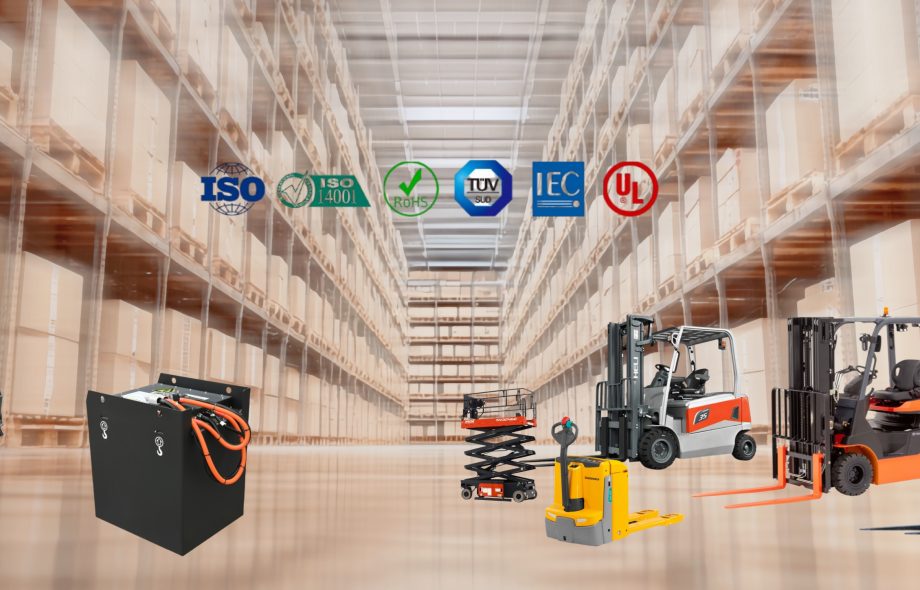When choosing the best battery for your forklift fleet, the decision between lead-acid and lithium-ion batteries is crucial. Both types of batteries offer distinct benefits, but understanding the key differences can help you make an informed decision. In this forklift battery comparison, we’ll break down the advantages and disadvantages of each, so you can determine which option is right for your business.
Lead-Acid Batteries: The Traditional Option
Lead-acid batteries have long been the go-to choice for forklift applications. They are typically more affordable upfront, which makes them attractive to businesses working within a limited budget. However, while lead-acid batteries are inexpensive initially, they come with several drawbacks that can affect your operations in the long term.
One of the primary limitations of lead-acid batteries is their shorter lifespan, which typically ranges between 500 to 1,000 charge cycles. This results in a higher replacement frequency, leading to more costs over time. Furthermore, charging lead-acid batteries takes a considerable amount of time—usually between 8 and 10 hours—resulting in longer downtime for your forklift operations.
Another disadvantage of lead-acid batteries is the maintenance required. These batteries require regular maintenance, including topping off the electrolyte levels and ensuring proper ventilation. This adds to the overall cost of ownership and requires dedicated labor to maintain the batteries in good condition.
Lithium-Ion Batteries: A Modern Solution
Lithium-ion batteries have gained traction in recent years due to their superior efficiency and convenience in forklift applications. Although the initial cost of lithium-ion batteries is higher, the long-term benefits they offer far outweigh the upfront investment.
In this forklift lithium battery comparison, one of the most significant advantages of lithium-ion batteries is their longer lifespan. With over 4,000 charge cycles, lithium-ion batteries can last significantly longer than their lead-acid counterparts. This extended lifespan means that businesses will not need to replace batteries as frequently, making them a more cost-effective option over time.
Lithium-ion batteries also have much faster charging times, typically around 2 to 4 hours, significantly reducing downtime and allowing forklifts to return to work sooner. This quick turnaround makes them ideal for businesses that require continuous operation and high productivity.
Moreover, lithium-ion batteries require little to no maintenance. They do not need regular checks or electrolyte topping off, unlike lead-acid batteries. This low-maintenance design reduces the time and costs associated with battery upkeep, making lithium-ion batteries more convenient for businesses seeking hassle-free solutions.
Why Choose Lithium-Ion Over Lead-Acid Batteries?
While lead-acid batteries may seem like an affordable choice initially, the long-term costs and operational challenges make them less appealing compared to lithium-ion batteries. Lithium-ion forklift batteries offer better performance, longer lifespan, and faster charging, which contribute to higher productivity and lower overall maintenance costs.
In addition to being cost-effective, lithium-ion batteries are more environmentally friendly. Unlike lead-acid batteries, lithium-ion batteries are free of harmful chemicals and are recyclable, making them a greener choice for businesses that prioritize sustainability.
Conclusion: The Winner in Forklift Battery Comparison
When conducting a forklift battery comparison, it becomes clear that lithium-ion batteries provide a much more advanced and reliable solution for most modern forklift operations. While lead-acid batteries may be suitable for businesses with lower upfront budgets, lithium-ion batteries offer a better return on investment due to their longevity, faster charging, minimal maintenance, and higher energy efficiency.
Upgrading to lithium-ion batteries will not only help you increase productivity but also reduce operational costs and enhance overall fleet performance. If you are looking to future-proof your operations and improve the efficiency of your forklift fleet, lithium-ion batteries are the clear choice.



 :
:









